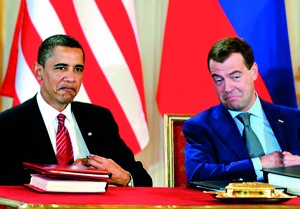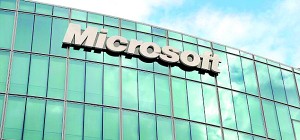Sunday Times 2
Kremlin finds way to avoid leaks: Typewriters
The Russian secret services are deploying an innovative new weapon in the age of cyber-spying – the almost forgotten typewriter.
Kremlin counter-intelligence officers reckon this is the only way to prevent their most classified information being stolen by the kind of computer-based data theft exposed by renegade U.S. agent Edward Snowden.

The decision to revert to typewriters among Russia's elite guards follows revelations that U.S. spies intercepted top-secret communications of the then Russian president, Dmitry Medvedev, right, pictured with U.S. President Obama in Prague (AFP)
An order for 20 typewriters has been made by the elite Federal Guard Service, known by the acronym FSO, which is in charge of protecting Russian president Vladimir Putin, his prime minister Dmitry Medvedev, and other senior officials, it was disclosed on Thursday.
‘After scandals with the distribution of secret documents by WikiLeaks, the exposes by Edward Snowden, reports about Dmitry Medvedev being listened in on during his visit to the G20 summit in London, it has been decided to expand the practice of creating paper documents,’ said a source.
Snowden’s presence with his laptops – said to be bulging with U.S. secrets – in the transit lounge at Moscow’s Sheremetyevo, brings the threat of cyber-spying home to Russia, explained pro-Kremlin newspaper Izvestia.
Unlike printers, every typewriter has its own individual pattern of type so it is possible to link every document to a machine used to type it, said the newspaper.
Typewriters rather than computers are already deployed, described as ‘normal practice to ensure security’, to record Putin’s deepest secrets, said another source.
‘Typewriters are still used in Russia’s power structures, like the Defence Ministry, the Emergencies Ministry, and the security services,’ said news agency RIA Novosti.
‘They are used predominantly for top secret messages addressed to the president or the defence minister.’
An order for the 20 new typewriters and 600 ink cartridges costing 486,500 (£9,880) by the FSO is shown – ironically – on a government website.
Putin has insisted that his secret services have not taken advantage of Snowden’s almost three weeks in Russia to grab his cache of intelligence.
© Daily Mail, London
| Microsoft helped the NSA and FBI spy on users’ emails and Skype calls
Microsoft Corp worked closely with U.S. intelligence services to help them intercept users’ communications, including letting the National Security Agency circumvent email encryption, the Guardian reported on Thursday. Citing top-secret documents provided by former U.S. spy contractor Edward Snowden, the UK newspaper said Microsoft worked with the Federal Bureau of Investigations and the NSA to ease access via Prism – an intelligence-gathering program uncovered by the Guardian last month – to its cloud storage service SkyDrive.  Revelations: Microsoft Corp worked closely with U.S. intelligence services to help them intercept users' communications, including letting the National Security Agency circumvent email encryption (AFP) Microsoft also helped the Prism program collect video and audio of conversations conducted via Skype, Microsoft’s online chat service, the newspaper added. Microsoft had previously said it did not provide the NSA direct access to users’ information. On Thursday, it repeated that it provides customer data only in response to lawful government requests. ‘To be clear, Microsoft does not provide any government with blanket or direct access to SkyDrive, Outlook.com, Skype or any Microsoft product,’ the company said in a statement on its website. Facebook Inc, Google Inc and Microsoft had all publicly urged U.S. authorities to allow them to reveal the number and scope of the surveillance requests after documents leaked to the Washington Post and the Guardian suggested they had given the government ‘direct access’ to their computers as part of the NSA’s Prism program. The disclosures have triggered widespread concern and congressional hearings about the scope and extent of the information-gathering. |
Follow @timesonlinelk

